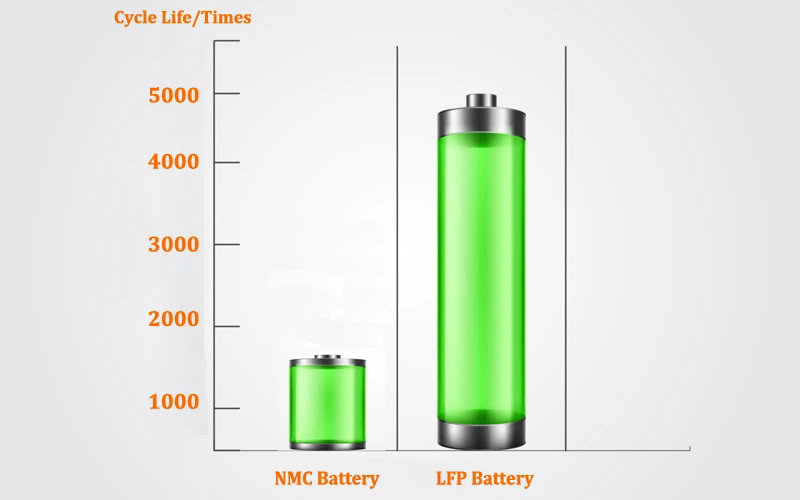Considering the type of rechargeable battery is essential when you are thinking about powering your electronic devices. However, there are various types of batteries on the market, and picking the most suitable battery can be challenging. While lead-acid and lithium-ion batteries have always been compared in the past, there are notably two battery types that are also often compared: Lifepo4 and lithium-ion batteries. While both Lifepo4 and Lithium-ion work well in many application environments, the noticeable differences may affect performance in certain program settings. Therefore, understanding the advantages and disadvantages of these two types of batteries is crucial for solar energy storage systems. In this article, we will explore the differences between LiFePO4 and lithium-ion batteries to help you make an informed choice.
Lifepo4 and Lithium-ion battery: What are the differences?
Lifepo4 and Lithium-ion batteries have similarities, supporting rechargeable, but they also have differences. You can make an in-depth comparison from the following seven aspects to make clear the difference between the two.
1. Chemical composition.
LiFePO4 battery, also known as lithium iron phosphate, is a kind of lithium-ion battery that uses lithium iron phosphate as cathode material and carbon as anode material. The rated voltage of the single battery is 3.2V, and the charging cut-off voltage is 3.6V~3.65V. LiFePO4 batteries are composed of lithium, iron, and phosphate ions, so they are safer to use, lighter in structure, and more stable in power output than other conventional batteries. On the other hand, lithium-ion batteries contain metal lithium and composite cathode materials such as cobalt, nickel, or manganese, so they have higher energy density and working efficiency.
2. Safety.
Lithium iron phosphate batteries consider to be a safer kind of battery because of their different chemical properties. The LiFePO4 battery has a built-in BMS management system to prevent failures caused by overheating, overcharging, over-discharge, or short circuits. By contrast, lithium-ion batteries are usually safe when used correctly, but if damaged or improperly handled, they are easy to overheat and cause fire. As a result, lithium iron phosphate batteries are usually the first choice when applications such as solar systems, electric vehicles, and industrial equipment pay more attention to safety.
3. Energy density.
Under the same volume or weight, the battery energy density determines the stored energy value. Compared with lithium-ion batteries, lithium iron phosphate is superior to lithium-ion batteries for its reliable safety, excellent performance, and longer service life. Lithium-ion batteries may have higher energy density than LiFePO4 batteries, so they widely used in consumer electronics. Nevertheless, LiFePO4 batteries are also very suitable for specific applications, such as backup power supplies, energy storage systems, and electric vehicles, safety and life are more important.
Compared with lithium-ion batteries, LiFePO4 batteries have a longer service life and even last for more than 10 years, while lithium-ion batteries usually have a service life of 2-3 years. It is due to the chemicals and structural materials of the two types of batteries. In addition, the service life is also affected by the use mode, charge and discharge habits, and other factors, but in general, LiFePO4 batteries are more durable than lithium-ion batteries.
5. Battery weight.
Compared with lead-acid batteries, LiFePO4 battery is much more lightweight, but lithium-ion battery is more lightweight than LiFePO4 battery because of energy density. In fact, the exact weight will depend on the size and capacity of each battery. If you are looking for the lightest option, the lithium-ion battery may be your choice. However, if you are willing to sacrifice a little weight for higher safety performance and longer service life, LiFePO4 batteries may be your better choice.
6. Operating temperature.
The operating temperature range of a LiFePO4 battery is -20~ 60 °C (- 4 ~ 140F), while that of a lithium-ion battery is 0 ~ 45 °C (32 ~ 113F), so the temperature range of a LiFePO4 battery is generally wider than that of lithium-ion battery. LiFePO4 batteries support operating in colder or hotter environments, and power and battery packs are not affected. This factor makes the LiFePO4 battery unaffected by the environment, and the battery pack will not be damaged under extreme conditions. Therefore, the stability and reliability of LiFePO4 batteries are an excellent choice for power applications, such as solar energy systems, electric vehicles, saloon cars, and marine applications.
7. Voltage.
LiFePO4 batteries have unique chemical properties, and release energy more slowly and stably, resulting in a longer service life. The voltage of lithium-ion batteries is higher, the discharge speed is faster, so the service life is shorter.

LiFePO4 and Lithium Ion Battery: advantages and disadvantages of Application in Solar Energy Storage system.
Compared with a lithium-ion battery, the LiFePO4 battery has a longer service life, comprehensive economic benefits in the long run, is not easy to catch fire, higher safety, and is environment-friendly. In the long run, LiFePO4 batteries will become a safer, more reliable, and more stable energy storage option. On the other hand, lithium-ion batteries are light in weight and are usually an ideal choice for consumer electronics. However, due to its short service life and less safety than LiFePO4 batteries, there are few applications in solar energy storage systems.
Conclusion.
Does solar energy storage battery choose LiFePO4 battery or lithium-ion battery? The answer is to identify which batteries best meet your actual needs. Since both options have advantages and disadvantages, it is important to determine which battery suits your actual situation and needs. LiFePO4 batteries are more advantageous and more stable if you want the highest comprehensive price-to-price ratio. Lithium-ion is usually cheaper in the short term, but it is more likely to overheat. Be sure to consider different factors before you make your final choice!
